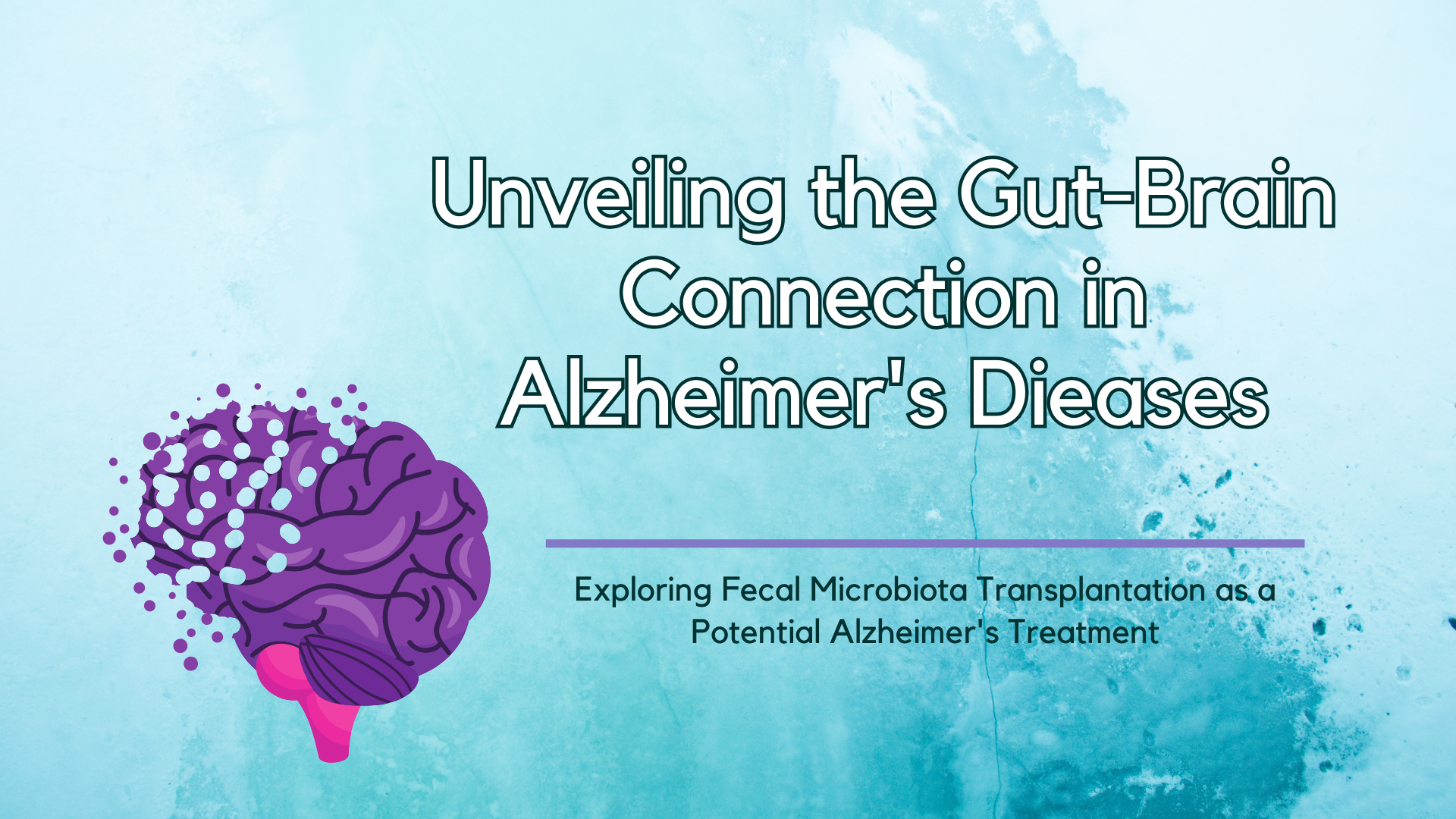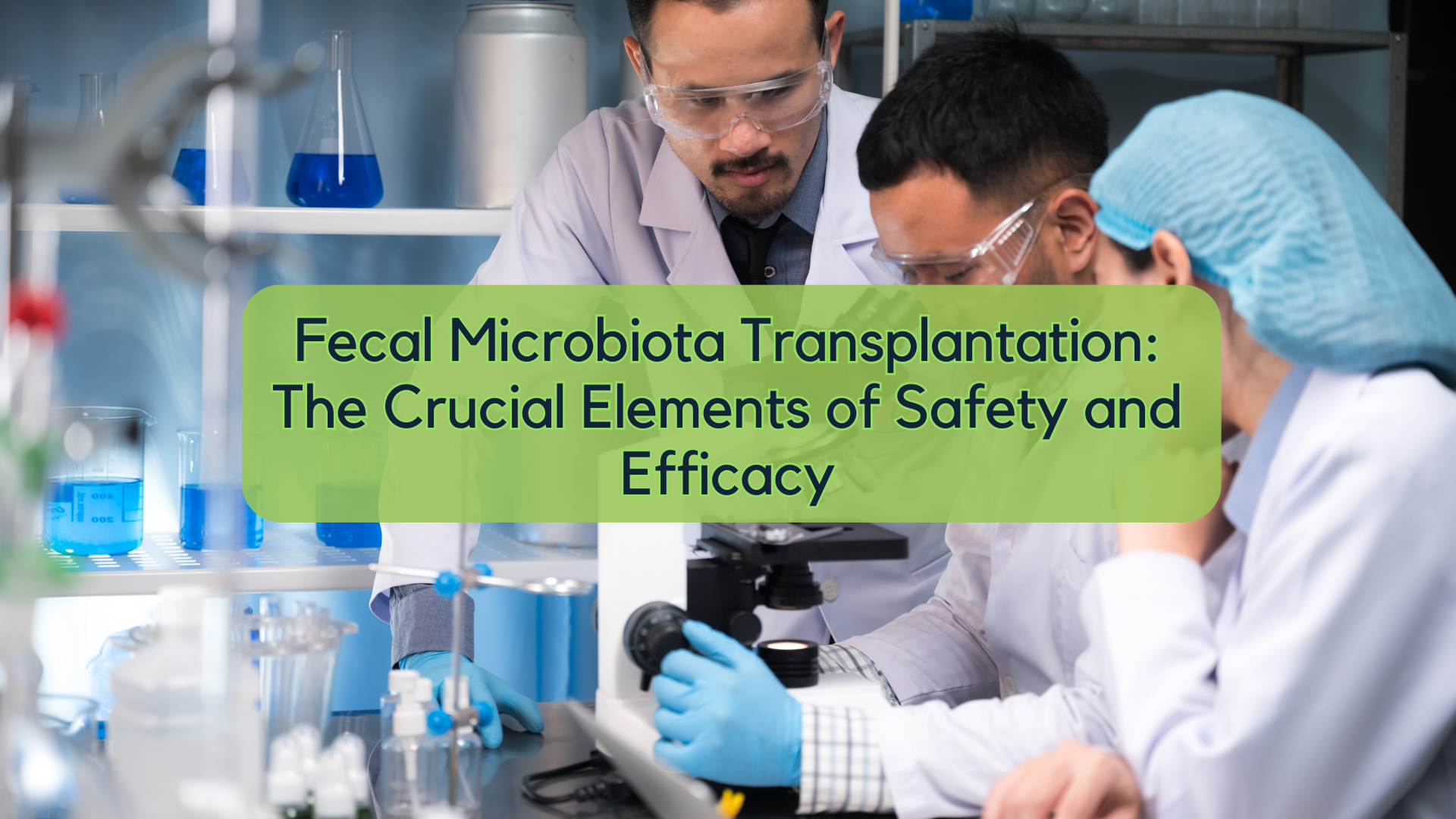Did you know the secret to a healthy brain might lie in our gut? Recent discoveries have unveiled an astonishing connection between our gut and brain via the gut-brain axis, a two-way highway for communication between these two systems. The gut-brain axis is assumed to involve many different pathways, including immune, neural, endocrine, and metabolic 1–11. This helps explain the gut's potential influence on various aspects of our health, including cognitive function. One area of particular interest is the gut microbiome's possible role in Alzheimer's disease, a devastating neurodegenerative disorder that affects millions worldwide. Let’s review the fascinating gut-brain connection and explore the promising avenue of fecal microbiota transplantation (FMT) as a potential treatment for Alzheimer's disease.
The Gut-Brain Axis: An Unlikely Connection
We all know that our gut plays a role in digesting food, but did you know it might also have a say in how our brains function? Increasing scientific evidence has shown that our gut microbiota are essential not only for gut health but also for the development and maintenance of brain function 2,3. The communication between the gut and the brain happens via the gut-brain axis, which has recently been thought to be a significant contributor to regulating normal brain functions and a possible risk factor for neurodegenerative disorders like Alzheimer's disease 12–15. Research shows that different microbial composition is associated with alterations in behaviour and cognition, highlighting the importance of this gut-brain connection 1,16–18.
Understanding the Role of the Gut Microbiome in Alzheimer's Disease
Alzheimer's disease is like a complex puzzle that scientists are working hard to solve. One piece of this puzzle involves the gut microbiome. Alzheimer’s disease, the most common form of dementia, is characterized by the accumulation of abnormal protein aggregates in the brain, leading to the deterioration of cognitive function 14,19,20. Emerging research suggests that the composition and diversity of the gut microbiome are altered in patients with AD, which might contribute to the development and progression of Alzheimer's disease 20–23. The decreased richness and diversity within the gut microbiome in patients with AD aligns with other studies showing alterations in the gut microbiome in other neurological conditions such as Parkinson’s disease and Multiple sclerosis 21,22,24–29. While the specific alterations responsible for the dysfunction within the gut microbiome (gut dysbiosis) may differ between conditions, it appears that alterations within the gut microbiota may play an important role in disease progression and maintenance, potentially triggering inflammatory and immune responses that ultimately affect brain health 16,19,21,23,30,31.
Fecal Microbiota Transplantation (FMT): A New Hope for Alzheimer's Treatment?
Fecal microbiota transplantation (FMT), also known as "stool transplantation," involves transferring fecal matter from a healthy donor into the gut of a recipient 32–35. FMT has been widely and effectively used to treat recurrent Clostridium difficile infections (cDiff), with over a 90% success rate 36–41. Based on the promising outcomes of treating cDiff, FMT has recently garnered attention as a potential therapy for various conditions, including those beyond the gut 32,35,36,42,43.
With accumulating evidence from both animal and clinical studies implicating the gut-brain axis and the gut microbiome in various neurological disorders, researchers have begun investigating whether FMT could impact brain health, making it a novel avenue for Alzheimer's treatment 2,8,19,44. While much of this work to date has been in animal models, recent studies have explored the potential of FMT in Alzheimer's disease treatment, yielding some promising results 45–47. Notably, two case studies have shown encouraging results reporting rapid improvements in AD symptoms, including mood, cognitive function and microbiota diversity 46,48,49.
Recently, a small pilot clinical trial was performed to evaluate the safety and efficacy of FMT as a potential treatment for cognitive impairment 50. This study reported that FMT capsules were safe. In addition, FMT was shown to maintain and improve cognitive function in those with mild cognitive impairment and change gut microbiota composition 50. While the research to date points to a connection between the gut microbiome and Alzheimer's disease and cognitive impairment, many unanswered questions need to be addressed, including optimal procedure, safety, long-term outcomes, and large-scale clinical trials to fully understand if FMT is a suitable treatment.
Conclusion
While the exact mechanisms linking the gut microbiome to Alzheimer's disease are still being unravelled, the gut-brain connection offers new avenues for understanding and potentially treating complex neurological disorders like Alzheimer's disease. Fecal microbiota transplantation represents a promising line of research, with early studies providing encouraging results, underscoring the importance of further investigating how the gut microbes might provide a new treatment avenue 46,48–50.
As the scientific community continues to explore the role of the gut microbiome in Alzheimer's disease, it is crucial to approach this research with cautious optimism. FMT could potentially revolutionize Alzheimer's treatment, but further studies are needed to fully understand its mechanisms and long-term effects. The journey of scientific discovery is an exciting one, and who knows, the cure for Alzheimer's might be closer than we think, hidden within the intricate harmony of our gut microbiome.
At Novel Biome, we're passionate about the importance of the gut microbiome and the transformative potential of Fecal Microbiota Transplantation (FMT) treatment to restore health. As an FMT contract manufacturer, we leverage our years of experience in FMT to manufacture high-quality FMT products utilizing our highly-screened donors and stringent manufacturing standards. If you are interested in learning more about our FMT products and manufacturing capabilities, please contact us HERE or to register as a clinical partner to order FMT products, click HERE.
References: 1. Chen, X. et al. 2013, 2. Cryan, J. F. et al. 2019, 3. Dinan, T. G. & Cryan, J. F. 2017, 4. Ding, X. et al. 2020, 5. Jendraszak, M. et al. 2021, 6. Liu, Z. et al. 2021, 7. Rhee, S. H. et al. 2009, 8. Rutsch, A. et al. 2020, 9. Skonieczna-Żydecka, K. et al. 2018, 10. Sudo, N. et al. 2004, 11. Wan, Y. et al. 2021, 12. Askarova, S. et al. 2020, 13. Deidda, G. & Biazzo, M. 2021, 14. Kesika, P. et al. 2021, 15. Ma, B. et al. 2019, 16. Li, H. et al. 2021, 17. Stilling, R. M. et al. 2014, 18. van Soest, A. P. M. et al. 2020, 19. Jiang, C. et al. 2017, 20. Zhuang, Z.-Q. et al. 2018, 21. Chidambaram, S. B. et al. 2022, 22. Fang, P. et al. 2020, 23. Vogt, N. M. et al. 2017, 24. Altieri, C. et al. 2023, 25. Ordoñez-Rodriguez, A. et al. 2023, 26. Romano, S. et al. 2021, 27. Westfall, S. et al. 2017, 28. Wu, N. et al. 2023, 29. Zapała, B. et al. 2021, 30. Megur, A. et al. 2020, 31. Zhu, X. et al. 2021, 32. Choi, H. H. & Cho, Y.-S. 2016, 33. Gupta, S. et al. 2021, 34. Ser, H.-L. et al. 2021, 35. Xu, M.-Q. 2015, 36. Allegretti, J. R. et al. 2019, 37. Cammarota, G. et al. 2015, 38. Kao, D. et al2017, 39. Lee, C. H. et al. 2016, 40. Lee, C. H. et al. 2019, 41. van Nood, E. et al. 2013, 42. Brandt, L. J. & Aroniadis, O. C. 2013, 43. Rinott, E. et al. 2021, 44. Serra, D. et al. 2019, 45. Jin, J. et al. 2023, 46. Nassar, S. T. et al. 2022, 47. Sun, J. et al. 2019, 48. Hazan, S. 2020, 49. Park, S.-H. et al. 2022, 50. Chen, X. et al. 2023.


 By: Dr. Shaina Cahill, Ph.D. (Director Of Operations and Medical Affairs)
By: Dr. Shaina Cahill, Ph.D. (Director Of Operations and Medical Affairs)





